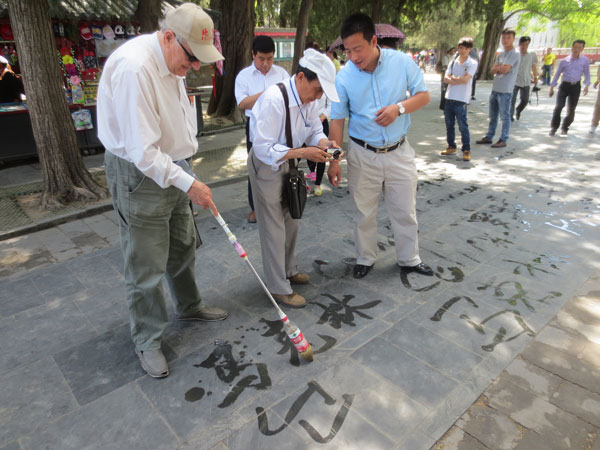Fan of the opera
An early Sinologist from Australia, Colin Mackerras is still discovering China, especially its ancient art forms. Liu Xiangrui reports.
Colin Mackerras was pursuing his master's degree at Cambridge University when he learned that foreign-language teachers were needed in China in the 1960s. He decided to give it a try despite the different geopolitical conditions back then.
His visits over half a century have resulted in hundreds of academic papers and dozens of books with views from within China and the West.
An early Australian to follow Asian studies with a focus on China, Mackerras is today known as an established Sinologist. He had taken up Chinese studies at the behest of his mother.
"I was interested in Chinese culture, especially theater," Mackerras, 77, says of his desire to come to China along with his wife, Alyce, in 1964.
Back then, China had no diplomatic relations with Australia.
Despite the challenges of living in a foreign country, they were able to make friends in China, and many remain so to date.
The couple taught until 1966 and left before the start of the "cultural revolution" (1966-76).
But Mackerras continued his Chinese studies in Australia. He returned to China in 1977 and has since visited time after time, mainly to teach and for research.
More recently, he has been dividing his time between the two countries.
He is now teaching at Beijing Foreign Studies University as professor emeritus.
Fluent in Chinese, Mackerras usually rides an old bike to class and spends a lot of time with his students.
In all these years, he has also followed his passion for Chinese opera, which he describes as "music of the people" as it was played outdoors.
Mackerras, who wrote his PhD thesis on Peking Opera, still has gramophones of the ancient art form.
"It took me a while to get used to the style of Chinese opera singing, which is so different from Western opera," he says. "But both are beautiful."
As an admirer of Peking Opera master Mei Lanfang, Mackerras says he is happy to see the art form being revived with government support today.
Mackerras, who has written books on Chinese opera, has explored the relationship between Chinese opera and society.
Other than research, his knowledge comes from extensive travels within the country, including in remote ethnic regions.
He has carried out interviews with ordinary people and local officials.
"I have a perspective over a relatively long period of time in China. It's very helpful for my research," he says.
Last year, he received the Special Book Award of China for foreign authors, translators and publishers who make significant contributions to China's literary and cultural exchanges with other countries.
He also continues to work on papers about China's ethnic groups and general social changes.
"People are living a richer life, not only materially but also spiritually. They are more open and confident than before," Mackerras says, adding that in the '60s, he couldn't have imagined the country's rapid transformation.
He has also documented the changing attitudes of the West toward China.
In Western Images of China Since 1949, he chronicles the background and reasons behind that change, placing them in context of the ground realities he experienced.
While he tries to bring different perspectives with his writings, he says the process isn't easy.
"I still think there are a lot of misunderstandings about China in the West," he says. "When the West looks at China, it is not entirely about the reality here but often more about their own politics."
In many ways, Mackerras, who has been involved in academic and cultural exchanges between China and his home country, is a pioneer in bringing people together.
He has established the Chinese Studies Association of Australia to boost such exchanges.
In 2007, Mackerras received one of Australia's highest awards for helping education and Sino-Australian ties.
He is a founding member of the School of Modern Asian Studies at Griffith University on the Australian east coast, where he has worked since mid-1970s.
Mackerras says there has been significant improvement in the relationship between the two countries. While exchanges in culture and education have been growing fast, China has also become Australia's top trading partner.
In 2014, Mackerras received the Friendship Award, the highest honor given by the Chinese government to foreigners who have made significant contributions to the country's social and economic development.
His life experience in China was noted by President Xi Jinping when he visited Australia that year.
During a speech at the Australian parliament, Xi thanked Mackerras for his contribution to the mutual friendship and especially mentioned Mackerras' 51-year-old son, who has the unique distinction of being the first Australian to be born in New China.
"I feel very proud about it," Mackerras says, smiling.
"Although I have no concrete plans, I hope I can come back to China again and again."
Contact the writer at liuxiangrui@chinadaily.com.cn
|
 Mackerras practices Chinese calligraphy with local residents in a Beijing park. |


















